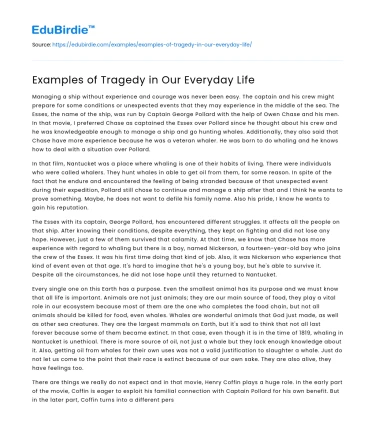Introduction
Tragedy, a concept often associated with dramatic literature and theater, is profoundly embedded in the fabric of everyday life. The manifestations of tragedy in daily experiences are as varied as they are pervasive, touching individuals and communities across the globe. From personal misfortunes to societal calamities, the impact of tragedy is inescapable and multifaceted. This essay aims to explore examples of tragedy as they occur in everyday life, highlighting the ways in which they shape human experience and understanding. By examining specific instances and drawing on credible sources, this paper will elucidate the complexity and inevitability of tragedy, while also considering counter-arguments that propose a perspective of resilience and hope amidst adversity. Ultimately, this exploration seeks to underscore the dual role of tragedy as both a source of suffering and a catalyst for profound human insight and transformation.
Personal Tragedies: Loss and Grief
Personal tragedies, such as the loss of a loved one, represent some of the most intimate and profound forms of tragedy in everyday life. The death of family members or close friends can leave indelible marks on individuals, altering their emotional landscapes and challenging their sense of normalcy. Elizabeth Kübler-Ross's model of the five stages of grief—denial, anger, bargaining, depression, and acceptance—illustrates the complex emotional journey that accompanies such losses (Kübler-Ross, 1969). These stages are not linear, and individuals may oscillate between them, highlighting the ongoing nature of personal tragedy.
Save your time!
We can take care of your essay
- Proper editing and formatting
- Free revision, title page, and bibliography
- Flexible prices and money-back guarantee
Real-life cases, such as the global COVID-19 pandemic, underscore the widespread impact of personal tragedies. Millions of families around the world have experienced loss, compounding the tragedy with the additional challenges of isolation and uncertainty. According to the World Health Organization, as of late 2023, COVID-19 has claimed over six million lives globally (WHO, 2023). This staggering statistic reflects not just individual tragedies but a collective experience of mourning and adaptation.
Critics might argue that focusing on personal tragedies risks ignoring the potential for personal growth and resilience that often follows such losses. However, acknowledging tragedy does not preclude the possibility of healing and growth. Instead, it provides a framework for understanding the depth of human emotions and the resilience that often emerges in the aftermath. As Viktor Frankl, a Holocaust survivor, and psychiatrist, noted, "In some ways suffering ceases to be suffering at the moment it finds a meaning" (Frankl, 1946). This perspective suggests that while personal tragedies are inevitable, they can also lead to significant personal transformation.
Societal Tragedies: Injustice and Inequality
Beyond personal losses, societal tragedies rooted in injustice and inequality represent another facet of tragedy in everyday life. These tragedies manifest through systemic issues such as poverty, discrimination, and violence, affecting entire communities and perpetuating cycles of suffering. The tragedy of racial injustice, for instance, has been a persistent issue in societies around the world. The Black Lives Matter movement, which gained significant momentum following the tragic death of George Floyd in 2020, highlights the ongoing struggle against racial inequality and violence (BLM, 2020). Such movements underscore the collective nature of societal tragedies and the urgent need for systemic change.
Economic inequality is another pervasive societal tragedy, with the wealth gap between rich and poor continuing to widen. According to Oxfam's 2022 report, the richest 1% of the world's population holds more wealth than the remaining 99% combined (Oxfam, 2022). This disparity not only perpetuates poverty but also limits access to essential resources such as education and healthcare, exacerbating social inequities and hindering societal progress.
While some may argue that societal tragedies are insurmountable, there is evidence to suggest that collective action and policy changes can mitigate these issues. The significant strides made in gender equality and LGBTQ+ rights over recent decades illustrate that societal tragedies can be addressed through sustained advocacy and reform. However, the persistence of these issues indicates the complexity of societal tragedies and the ongoing need for vigilance and action.
Environmental Tragedies: Human Impact on Nature
Environmental tragedies, resulting from human activities, represent another significant form of tragedy in everyday life. Climate change, deforestation, and pollution are causing irreversible damage to ecosystems, threatening biodiversity and human livelihoods. The Intergovernmental Panel on Climate Change (IPCC) reports that human-induced climate change is leading to more frequent and severe weather events, resulting in loss of life, displacement, and economic hardship (IPCC, 2023).
Real-life examples, such as the Australian bushfires of 2019-2020, illustrate the devastating impact of environmental tragedies. These fires burned over 18 million hectares of land, destroyed thousands of homes, and resulted in the loss of an estimated three billion animals (WWF, 2020). Such events highlight the interconnectedness of human and environmental health and the urgent need for sustainable practices.
Critics may argue that focusing on environmental tragedies overlooks the potential for technological innovation and adaptation. While technological advancements can mitigate some impacts, the root causes of environmental tragedies often lie in unsustainable practices and policies. Addressing these requires systemic changes and a collective commitment to environmental stewardship. As renowned naturalist David Attenborough stated, "The natural world is under serious threat, and the time to act is now" (Attenborough, 2020).
Conclusion
Tragedy, in its various forms, is an inescapable aspect of everyday life. Personal, societal, and environmental tragedies each present unique challenges and opportunities for growth and understanding. While the inevitability of tragedy may seem daunting, it also serves as a reminder of the resilience inherent in the human spirit. By acknowledging and addressing these tragedies, individuals and societies can foster meaningful change and transformation. The exploration of tragedy in everyday life reveals not only the depth of human suffering but also the potential for profound insight and progress. As we navigate the complexities of the modern world, it is imperative to recognize tragedy as both a challenge to be confronted and a catalyst for enduring hope and renewal.






 Stuck on your essay?
Stuck on your essay?

